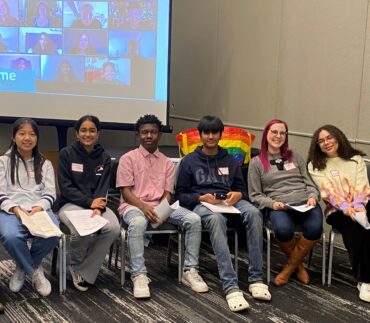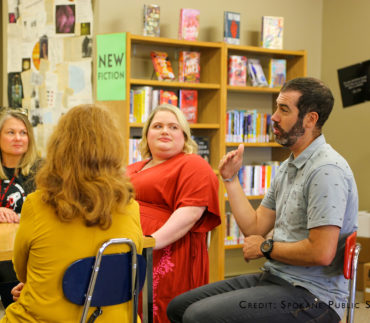
Education Equity Fund awards more than $1 million for projects that focus on anti-racism in education systems
College Spark Washington awarded over $1 million in grant funding to six Washington organizations through the Education Equity Fund including: the Alliance for a Just Society, the Puget Sound Educational Service District, Seattle Central College, Shoreline Public Schools, the State Board for Community and Technical Colleges, and the Yakima School District.
The Education Equity Fund supports work designed to dismantle barriers to equity in education for students in high school and at community and technical colleges. Project funding is available for work that has one or more of the following areas of focus:
- Alternatives to exclusionary discipline in high school
- Placement at community and technical colleges
- Community centered decision-making
- Culturally responsive curriculum and pedagogy
- Anti-racist leadership development
“We believe in the wisdom of students and communities to shape their futures, and we recognize that there’s no one right answer to the education challenges communities face. That’s why we encourage the ingenuity that lives within communities and support community-designed and community-driven educational change across Washington.”
“We believe in the wisdom of students and communities to shape their futures, and we recognize that there’s no one right answer to the education challenges communities face,” said Dr. Warren Brown, Executive Director at College Spark Washington. “That’s why we prioritize and encourage the ingenuity that lives within communities and support community-designed and community-driven educational change across Washington.”
Below is a list of grantees and a summary of their project:
Alliance for a Just Society – $180,000
Communities for Our Colleges is a campaign launched by Alliance for Justice in 2020 to support on-campus student organizing and advocacy in Washington’s two-year colleges. Grant support will help build campus organizing activities at Highline College, Shoreline College, and Yakima Valley College aimed at engaging students in the new state racial equity strategic planning process to ensure these plans include and reflect student priorities. An additional goal is to build and refine a community-centered decision-making model for future organizing at other campuses.
Puget Sound Educational Service District – $180,000
The Puget Sound Educational Service District will develop, launch, refine, and expand an Anti-Racist Professional Growth and Leadership Institute. Its purpose is to strengthen support for educators of color and to make schools more hospitable environments capable of retaining them. Training will be developed and delivered by the 160 participants in the PSESD Educators of Color Leadership Community alongside their supervisors and other staff members wo are working to create climates that support educators of color. Grant funding will also support a leadership and mentoring strand for teachers of color. Once the Leadership Institute is developed and piloted, PSESD aims to scale the training across its service region of King and Pierce counties.
Seattle Central College – $180,000
Seattle Central College plans to revise its Basic and Transitional Studies (BTS) curriculum to make it more inclusive and culturally responsive. BTS includes Adult Basic Education, English as a Second Language, high school completion, and GED. About 85% of BTS students at SCC are BIPOC, and only about 10% transition to college-level courses after a year. To better meet the needs of these students, SCC will assemble a team of faculty and students of color to guide a process of division-wide professional development and revision of curriculum to advance anti-racist teaching. Planned topics for professional development include anti-racist teaching practices, identifying anti-racist materials, defining anti-racist course outcomes, and translating knowledge to practice.
Shoreline Public Schools – $150,000
Shoreline Public Schools will use grant funding to support the next steps in its racial equity and anti-racism professional learning and skill building for teachers and staff. Activities to build a more anti-racist culture in its schools include: 1) establishing, staffing, and training support for Students Organized Against Racism (SOAR) groups at two comprehensive high schools; 2) professional development for staff and families in family engagement, including deepening work with the University of Washington Family Leadership Design Collaborative; 3) building more reciprocal relationships with the Snoqualmie and Tulalip tribes, including district contributions towards educational opportunities and tribal needs; and 4) establishing a Cultural Broker Program for BIPOC, immigrant, and English non-dominant families to work with other families like them around navigating the school system while also supporting relationships between school and families that establish trust and relationships through shared goals for students.
State Board for Community and Technical Colleges – $180,000
The State Board for Community and Technical Colleges (SBCTC) will use grant funding to support the formation of a CTC-Tribal Advisory Board to strengthen relationships between tribal communities and the community and technical college system in Washington state. The advisory board will consist of tribal, CTC, and community representatives including tribal elders and linguists. The work of forming the CTC-Tribal Advisory Board includes identification and recruitment of members, writing bylaws, defining roles and responsibilities, and development of a strategic plan for the ongoing work of the Board. The strategic plan will include CTC system-wide professional development and training, tribal consultation, expanded American Indian/Indigenous Studies programs, expanded career and technical education and workforce programs focused on the needs of tribes, and improved student services.
Yakima School District – $180,000
The Yakima School District plans to launch and support a new program called the Superintendent Student Advisory Council Fellowship (SSAC). The purpose of the fellowship is to reimagine the district’s thinking about student voice to make it more engaging, authentic, and transformative. SSAC students will engage with district departments and leaders on making change in their district. Students will meet with the Superintendent monthly to vision set, brainstorm, and build relationships. They will choose a district partner to engage with in developing an action project, connect with students who have similar interests to implement their projects in groups, and have ongoing meeting with their district partner to receive information, develop skills, and get support in executing their plans.
Learn more about the Education Equity Fund giving guidelines and priorities or contact Rachel Clements, Program Officer at College Spark, for more information.



